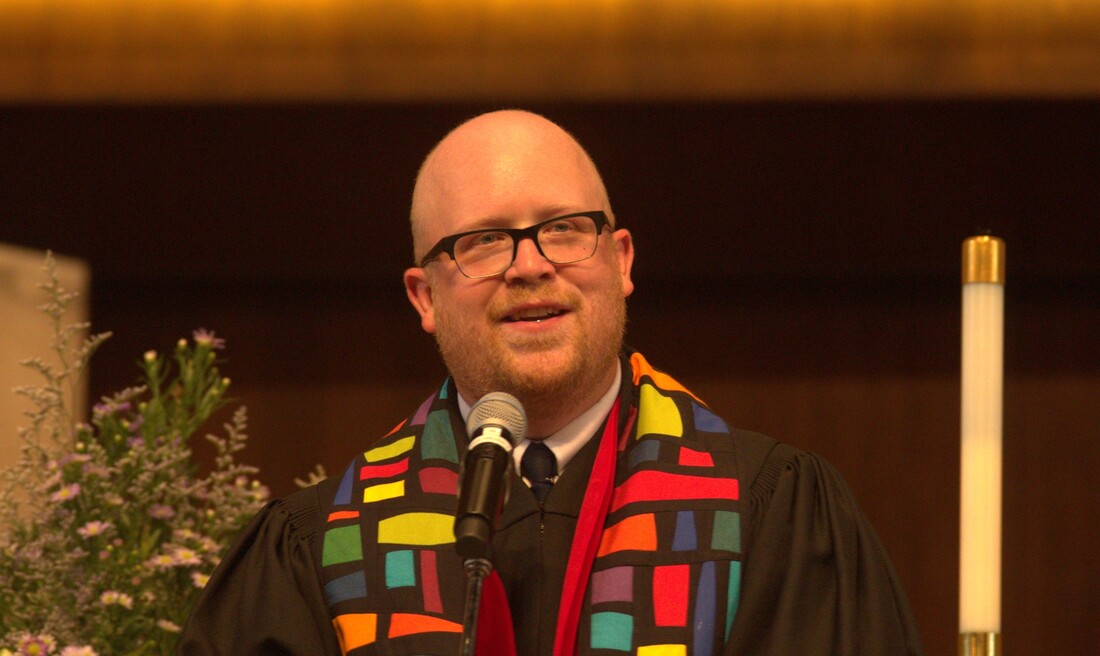|
Over the last month, I’ve mentioned several times in worship that I will be on Sabbatical this
spring. In September, the Board of Trustees met and approved my proposal for sabbatical leave from January 15 – June 15. What’s a Sabbatical for ministers? Sabbaticals have a long history in the Unitarian Universalist ministry, as a time every 4-7 years that is set aside for study, rest, and spiritual deepening: Fritz Hudson was on sabbatical twice during his time in Lincoln, Charles at least once, though records are harder to find from that time. A sabbatical is an opportunity to think about shared ministry: this is my sixth year in Lincoln, and the congregation and I are no longer getting to know each other. Over the last five years we’ve launched a new ministry, reworked our music program, introduced new worship services, engaged in making justice together, rewrote our bylaws, and responded to the last several years of the pandemic. A sabbatical is designed to be an opportunity to take a breath in the midst of shared ministry: to step back and have time to consider “where are we going together?” The questions that animated the first five years of my ministry in Lincoln (How can we organize our governance? How do we respond to the pandemic? What door does this key open?) are probably not the questions of the next five years. This spring is a chance to start to discern some of those next questions. This sabbatical is also an opportunity for me to finish my doctoral work. As you read in this column last month, I am putting together an oral history of the pandemic at UCL for my Doctor of Ministry (D.Min) thesis at Wesley Theological Seminary. I will spend much of this spring editing, refining, and eventually presenting that project in academic settings, before graduating in May 2023. Last, the sabbatical is an opportunity to rest. The last three years have been hard ones for clergy, along with every other helping profession. I am carrying my own wounds and tender places from this time, and I look forward to having some time to intentionally tend to them. Where will you be? From January 15 – June 15, Stacie, Ailish and I will live in the village of Bessels Green, in the UK. The Sevenoaks Unitarian congregation will host us in their parsonage, in return I will be preaching for their congregation twice a month. Last winter, I reached out to the English Unitarian denominational offices, and told them the story of Charles Stephen’s pulpit swap in the 1970s. One thing led to another, and we found this small congregation in transition that is excited to host my family and I for a short time. What will happen in Lincoln? Much like we’ve done during sabbaticals for our RGL Director and Admin Director, there is a written sabbatical plan, laying out the areas of my work, and how they will be covered in my absence. Worship will be led by a combination of lay voices and ministers from across Unitarian Universalism, including a monthly worship series from one of my colleagues (more on this soon!) Over the next several months, I will be communicating often about what is happening in this planning, as well as who to contact about what while I am away. I know that it is a privilege to have this opportunity, and it is one that I am deeply grateful for. The sabbatical tradition in Unitarian Universalism is what makes long ministries vital – and this is a congregation with a history of long, vital ministries. As I move in the latter half of my first decade in Lincoln, it is a good time to take a breath, take stock, celebrate what we’ve done, and discover what we can do together next.
0 Comments
Leave a Reply. |
Details
AuthorRev. Oscar Sinclair serves as the Settled Minister for The Unitarian Church of Lincoln, Nebraska. Archives
March 2024
Categories |
contact us and WE WILL GET BACK TO YOU AS SOON AS POSSIBLE: |
SIGN UP TO RECEIVE
|
THE UNITARIAN CHURCH
|
|


 RSS Feed
RSS Feed

